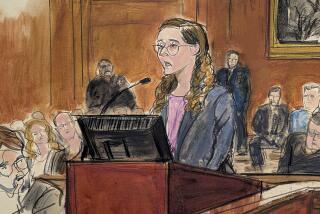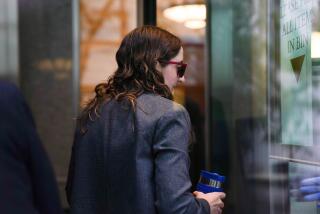2 More Figures in Levine Case Plead Guilty to Insider Trading Charges
- Share via
NEW YORK — Two former employees of the investment firm of Lazard Freres pleaded guilty Monday to federal felony charges for their roles in the largest insider trading ring ever uncovered.
Robert M. Wilkis, 37, a former vice president of Lazard and of E. F. Hutton, pleaded guilty to one count each of securities fraud, mail fraud, tax evasion and bringing more than $10,000 in cash into the United States without reporting it. He faces a maximum sentence of 20 years in prison and a fine of $850,000.
Randall D. Cecola, 25, a former junior financial analyst at Lazard, pleaded guilty to two counts of filing a false tax return. He faces a maximum sentence of six years in prison and $500,000 in fines.
Both men will be sentenced in February.
Cecola on Monday also settled civil charges by the Securities and Exchange Commission that he illegally made $21,800 in profits by trading on illegal inside information and that he and Wilkis swapped tips about takeover deals pending at the firm. Cecola agreed to give up the illegal profits and to be permanently barred from the securities industry, but he did not admit or deny the charges.
Wilkis and Cecola were participants in an insider trading ring run by Dennis B. Levine, a former mergers specialist at the investment firm of Drexel Burnham Lambert, federal authorities allege. Levine has already pleaded guilty to felony charges in the case and agreed to give up more than $11.5 million in illicit trading profits that he had accumulated in a Bahamian bank account.
The most prominent member of the ring, according to authorities, was stock speculator Ivan F. Boesky, who last month settled SEC charges by paying $100 million in penalties and illegal profits.
In a statement issued outside the Manhattan courtroom where Wilkis entered his plea, his lawyer, Gary P. Naftalis, said: “This is a tragic day for Robert Wilkis and his family. (He) feels great remorse for what he has done and the pain that his conduct has caused to his family, friends and business associates.”
Federal prosecutors said Wilkis had admitted tipping Levine to a pending takeover bid for Textron, the Providence, R.I., conglomerate, from Chicago Pacific in 1984. Wilkis made $137,268 and Levine $200,076 by trading on the confidential information. Wilkis made an additional $300,232 in 1985 by trading the stock of American Natural Resources on a tip from Levine that a takeover bid was coming from Coastal Corp.
Moreover, Wilkis failed to report on his 1985 tax return more than $2.5 million in income largely generated by his illicit trading. Consequently, he underpaid his taxes by $1.32 million.
On the final felony count, prosecutors said Wilkis violated the law in 1985 by bringing $100,000 in cash into the country from the Cayman Islands, where he maintained a bank account for his illicit profits, without reporting it. Wilkis has previously settled SEC civil charges in the case by giving up $3.3 million in cash and assets.
Cecola, who is currently a student at Harvard Business School, traded illegally in seven takeover transactions, the SEC charged. After learning of the pending deal for Textron by Chicago Pacific, a Lazard client, while he was a financial analyst for the investment firm in 1984, he tipped Wilkis to the deal and began himself to trade stock options in Textron.
Because Lazard forbade him to trade options at the time, Cecola bought the securities through brokerage accounts in Barrington, Ill., and Indianapolis that were opened in the names of two friends. He did the same in options of Houston Natural Gas in 1985 after Wilkis tipped him to a pending offer for the company from InterNorth. He also bought shares of American Natural Resources stock in 1985 after Wilkis tipped him to the pending takeover bid from Coastal Corp.
Cecola made $5,719 in Textron, $4,750 in HNG and $14,475 in ANR, the SEC charged. Federal prosecutors charged that he failed to report the more than $66,000 in taxable income he earned in 1984 and 1985 on the brokerage accounts in his friends’ names. Cecola paid his friends money to cover their additional tax liability, said Assistant U.S. Atty. Charles Carberry, but did not declare it on his own returns.
More to Read
Inside the business of entertainment
The Wide Shot brings you news, analysis and insights on everything from streaming wars to production — and what it all means for the future.
You may occasionally receive promotional content from the Los Angeles Times.










